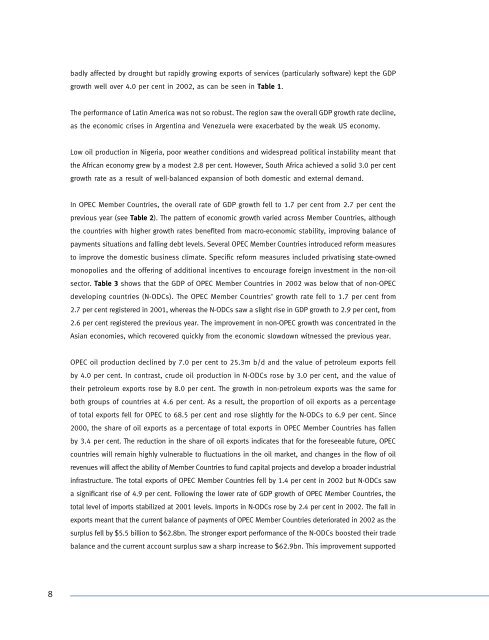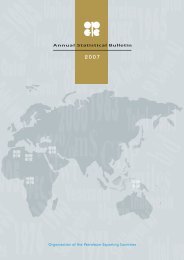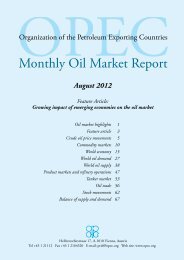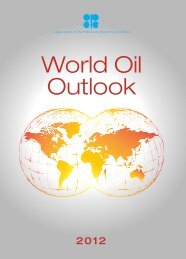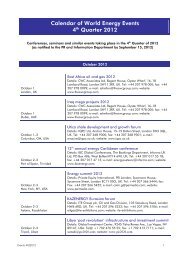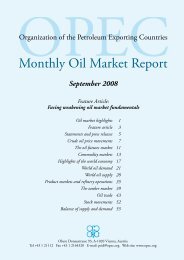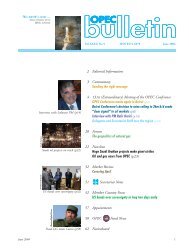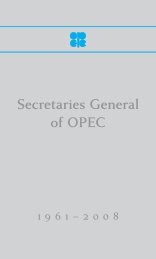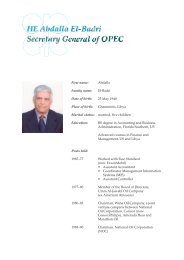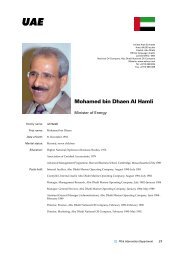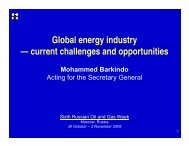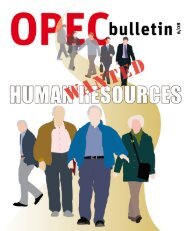2002 - OPEC
2002 - OPEC
2002 - OPEC
You also want an ePaper? Increase the reach of your titles
YUMPU automatically turns print PDFs into web optimized ePapers that Google loves.
8<br />
badly affected by drought but rapidly growing exports of services (particularly software) kept the GDP<br />
growth well over 4.0 per cent in <strong>2002</strong>, as can be seen in Table 1.<br />
The performance of Latin America was not so robust. The region saw the overall GDP growth rate decline,<br />
as the economic crises in Argentina and Venezuela were exacerbated by the weak US economy.<br />
Low oil production in Nigeria, poor weather conditions and widespread political instability meant that<br />
the African economy grew by a modest 2.8 per cent. However, South Africa achieved a solid 3.0 per cent<br />
growth rate as a result of well-balanced expansion of both domestic and external demand.<br />
In <strong>OPEC</strong> Member Countries, the overall rate of GDP growth fell to 1.7 per cent from 2.7 per cent the<br />
previous year (see Table 2). The pattern of economic growth varied across Member Countries, although<br />
the countries with higher growth rates benefited from macro-economic stability, improving balance of<br />
payments situations and falling debt levels. Several <strong>OPEC</strong> Member Countries introduced reform measures<br />
to improve the domestic business climate. Specific reform measures included privatising state-owned<br />
monopolies and the offering of additional incentives to encourage foreign investment in the non-oil<br />
sector. Table 3 shows that the GDP of <strong>OPEC</strong> Member Countries in <strong>2002</strong> was below that of non-<strong>OPEC</strong><br />
developing countries (N-ODCs). The <strong>OPEC</strong> Member Countries’ growth rate fell to 1.7 per cent from<br />
2.7 per cent registered in 2001, whereas the N-ODCs saw a slight rise in GDP growth to 2.9 per cent, from<br />
2.6 per cent registered the previous year. The improvement in non-<strong>OPEC</strong> growth was concentrated in the<br />
Asian economies, which recovered quickly from the economic slowdown witnessed the previous year.<br />
<strong>OPEC</strong> oil production declined by 7.0 per cent to 25.3m b/d and the value of petroleum exports fell<br />
by 4.0 per cent. In contrast, crude oil production in N-ODCs rose by 3.0 per cent, and the value of<br />
their petroleum exports rose by 8.0 per cent. The growth in non-petroleum exports was the same for<br />
both groups of countries at 4.6 per cent. As a result, the proportion of oil exports as a percentage<br />
of total exports fell for <strong>OPEC</strong> to 68.5 per cent and rose slightly for the N-ODCs to 6.9 per cent. Since<br />
2000, the share of oil exports as a percentage of total exports in <strong>OPEC</strong> Member Countries has fallen<br />
by 3.4 per cent. The reduction in the share of oil exports indicates that for the foreseeable future, <strong>OPEC</strong><br />
countries will remain highly vulnerable to fluctuations in the oil market, and changes in the flow of oil<br />
revenues will affect the ability of Member Countries to fund capital projects and develop a broader industrial<br />
infrastructure. The total exports of <strong>OPEC</strong> Member Countries fell by 1.4 per cent in <strong>2002</strong> but N-ODCs saw<br />
a significant rise of 4.9 per cent. Following the lower rate of GDP growth of <strong>OPEC</strong> Member Countries, the<br />
total level of imports stabilized at 2001 levels. Imports in N-ODCs rose by 2.4 per cent in <strong>2002</strong>. The fall in<br />
exports meant that the current balance of payments of <strong>OPEC</strong> Member Countries deteriorated in <strong>2002</strong> as the<br />
surplus fell by $5.5 billion to $62.8bn. The stronger export performance of the N-ODCs boosted their trade<br />
balance and the current account surplus saw a sharp increase to $62.9bn. This improvement supported


